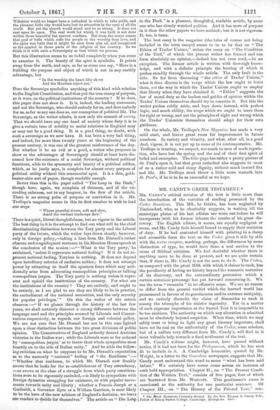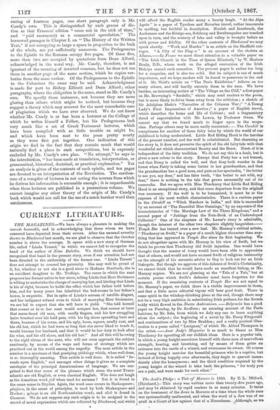MR. CINDY'S GREEK TESTAMENT.*
Ma. CANDY'S critical revision of the text is little more than the introduction of the varieties of reading presented by the Codex Sinaiticus. This MS., he thinks, has been neglected by Tischendorf, who, as he charitably suggests, is waiting till the stereotype plates of his last edition are worn out before he will incorporate :with his former labours the results of his great dis- covery. The English editors, it seems, are equally negligent or mean, and Mr. Candy feels himself bound to supply their omission of duty. If he had contented himself with printing in a cheap and accessible form the text as the Codex gives it side by side with the text us receptus, marking, perhaps, the differences by some distinction of type, he would have done a real service to the cause of Biblical criticism. We feel doubtful whether there is anything more to be done at present, and we are quite certain that, if there is, Mr. Candy is not the man to do it. The Codex, as compared with the great MSS. with which it claims to rank, has the peculiarity of having no history beyond the romantic narrative of its discovery, and the extraordinary pretension which a certain notorious personage has put forward concerning it. We use the term " romantic" in no offensive sense. We see no reason to differ from the general verdict which the learned world has pronounced in favour of its genuineness and its extreme antiquity, and we entirely discredit the claim of Simonides to rank it among the triumphs of his sinister ingenuity. Yet in a matter of such supreme importance as the Sacred Text it is impossible to be too cautious. The authority on which any alteration is admitted must be absolutely beyond suspicion. When time, which we may safely trust to bring to light any great literary imposture, shall have set its seal on the authenticity of the Codex, some scholars, but of a calibre very different from Mr. Candy's, will find in it most valuable help towards a final settlement of the text.
Mr. Candy's volume might, however, have passed without notice, if it had not been for the Prolegomena, which he has seen fit to include in it. A Cambridge humourist, quoted by Mr. Wright, in a letter to the Guardian newspaper, suggests that Mr. Candy must understand this word to mean "what has been said before." We certainly have never come across an instance of such bold appropriation. Chapter II., on "The Present Condi- tiod of the Written Text," consists of five pages, four of which are borrowed from Mr. Westcott. This gentleman's name is mentioned as the authority for one particular sentence. Of Chapter III., on "The History of the Printed Text," con-
* The 6reek Testament Critically Revised. By the Rev. Thomas LI. Candy, LED., Follow of Sidney Sussex College, Cautbsidge. ttiviugtena. 1807.
slating of fourteen pages, one short paragraph only is Mr. Candy's own. This is distinguished by such graces of dic- tion as that Erasmus' edition "came out in the nick of time," and "paid enormously as a commercial speculation." The borrowed passages in Chapter I. on "The History of the Written Text," if not occupying so large a space in proportion to the bulk of the whole, are yet sufficiently numerous. The Prolegomena to the Epistle to the Romans occupy five pages. Of these five, more than two are occupied by quotations from Dean Alford, acknowledged in the usual way. Mr. Candy, therefore, is not ignorant of the meaning of inverted commas, but he does not use them in another page of the same section, which he copies ver- batim from the same author. Of the Prolegomena to the Epistle to the Colossians the same may be said. Acknowledgment is made for part to Bishop Ellicott and Dean Alford ; other paragraphs, where the obligation is the same, stand as Mr. Candy's own. We specify these instances, not because they are more glaring than others which might be noticed, but because they suggest a theory which may account for the most remarkable case of plagiarism which we have ever observed. We da not know whether Mr. Candy is or has been a lecturer at the College of which he writes himself a Fellow, but his Prolegomena look very much like a set of Greek Testament lectures, which have been compiled with as little trouble as might be, and which have been sent to the press pretty nearly as they were first put together. One indication of this origin we find in the fact that they contain much that would naturally find a place in such compositions, but is expressly excluded by Mr. Candy's own plan. "No attempt," he says in the introduction, "has been made at translation, interpretation, or grammatical, historical, doctrinal, or practical explanation." Yet an analysis is given of the contents of each epistle, and ten pages are devoted to an interpretation of the Revelation. The careless- ness of a compiler of lectures in not noting the sources from which he derives his information is excusable enough ; it is unpardonable when these lectures are published in a pretentious volume. We cannot imagine any other theory of the origin of Mr. Candy's book which would not call for the use of a much harsher word than carelessness.































 Previous page
Previous page